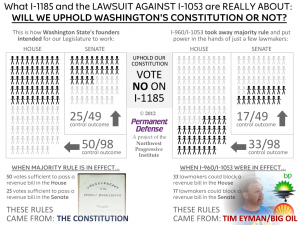October 17th, 2013
“Get Ready” goes up on the air as the NO on I-517 Coalition’s first television spot
From the Campaign Trail
This morning, the NO on I-517 Coalition, which NPI’s Permanent Defense is proud to be part of, launched its first television ad urging a no vote on Tim Eyman’s I-517. The spot is now airing on a number of television stations in the Puget Sound region. Here’s a description of it from the coalition’s press release:
“Get Ready” shows the intrusive nature of I-517 by depicting scenes of what petitioning inside of public buildings could look like. Signature gatherers are shown trying to get signatures from people reading in a quiet section of a library, baseball players at a neighborhood ballgame, fans getting food from a concession stand at CenturyLink Field, and shoppers trying to go into a store to get groceries.
Petitioners are already allowed under current law to gather signatures outside of public buildings and on public sidewalks, but under I-517, the scenes in “Get Ready” would become Washington’s new reality.
I-517 also makes it illegal for anyone to interfere with a signature gatherer’s activities in any way. Section 2 of I-517 explicitly says that petitioners must be allowed to operate directly in front of the entrances and exits of “any store”, even freestanding stores on private property. I-517 just goes too far.
“Our concern is to ensure our customers have the best experience they can, and I-517 would negatively impact that experience,” said Jan Teague of the Washington Retail Association. “We worry about our customers being harassed and not being able to do anything to stop it. That’s why our coalition is working to educate voters about the consequences of I-517. We urge all Washingtonians to join us in voting no on 517 and protecting free speech and property rights.”
The NO on I-517 Coalition is one of the most diverse efforts to defeat a ballot measure in Washington State history. It includes businesses and trade associations, labor unions, civic groups, sports teams like the Seattle Seahawks and Sounders FC, and people and groups from across the political spectrum, such as the Washington State Democratic Party and the Mainstream Republicans of Washington.
Governor Jay Inslee and former Attorney General Rob McKenna, who ran each other for the state’s top position last year, are both opposed to I-517, as is former Auditor Brian Sonntag and former Secretaries of State Sam Reed and Ralph Munro.
Those who would like to view the ad can watch it on YouTube.
The ad’s transcript is as follows:
Narrator: Get ready. With Tim Eyman’s Initiative 517, paid signature gatherers will have free reign. Inside stadiums, zoos, libraries…. wherever they want. Even if they violate property rights.
517 grants signature gatherers such special rights that restricting them in any way is a crime. And under 517, every initiative with enough signatures would qualify, even if it’s clearly illegal or unconstitutional.
Vote no on 517… before we can never say no again.
The Secretary of State’s office says ballots should reach all Washington State voters by October 22nd. We urge all Washingtonians to join us in voting NO on I-517 and rejecting Tim Eyman’s latest self-serving initiative.



